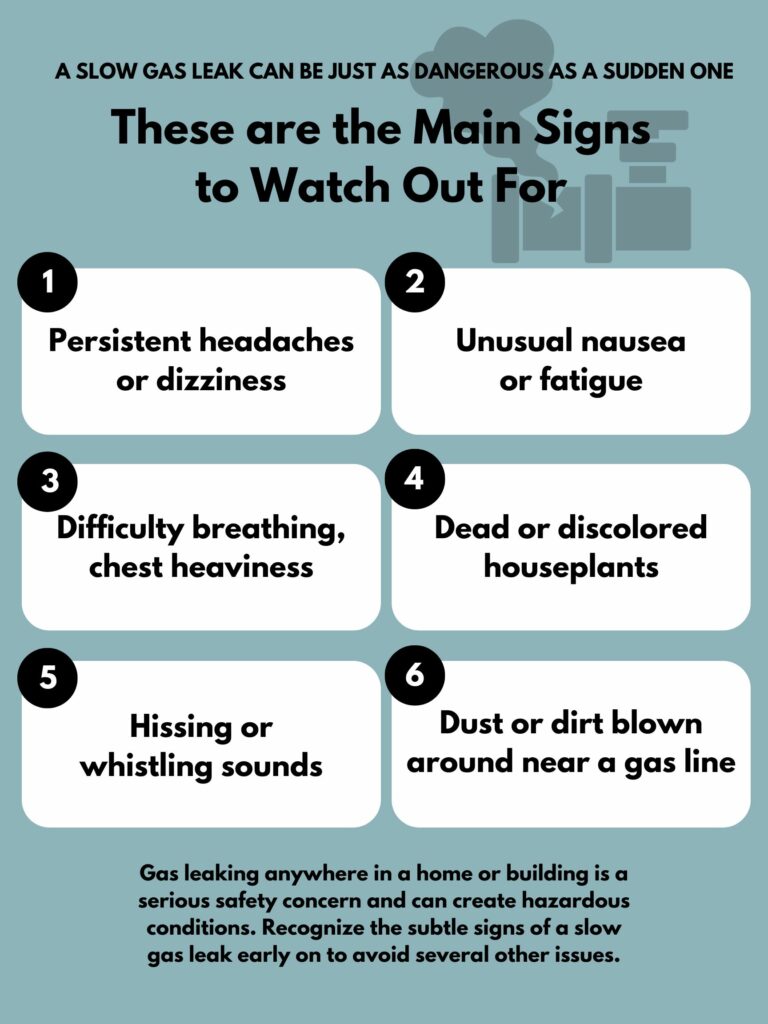A slow gas leak, while often subtle, poses a serious threat to your safety and well-being. Natural gas is odorless, but a chemical called mercaptan is added to give it a distinctive rotten egg smell, acting as a crucial warning sign. Recognizing the early symptoms of a slow gas leak is essential for preventing potentially catastrophic consequences. This article will delve into common slow gas leak symptoms, providing you with the knowledge to identify and respond to this dangerous situation effectively.
This comprehensive guide will explore various indicators of a slow gas leak, including unusual sounds, smells, and changes in your environment. We’ll also outline the crucial steps to take if you suspect a leak, emphasizing safety as our top priority.
Slow Gas Leak Symptoms

Detecting a slow gas leak often requires paying close attention to subtle cues. While a sudden burst of gas is easily noticeable, a gradual leak can be more insidious. Here are some key symptoms to watch out for:
Hissing Sound Near Appliances
One of the most common signs of a slow gas leak is a hissing sound emanating from gas appliances or pipes. This sound indicates that gas is escaping at a steady rate. Pay attention to any unusual noises near your stove, oven, water heater, furnace, or gas lines. Even a faint hissing can be a warning sign.
Rotten Egg Smell
The distinctive rotten egg smell added to natural gas serves as a crucial safety measure. If you detect this odor in your home, it’s a clear indication of a potential slow gas leak. Don’t ignore this smell; it’s a serious warning that requires immediate action. The intensity of the smell may vary depending on the size and location of the leak.
Dying Vegetation
While not always directly related to a slow gas leak, dying or discolored vegetation near gas lines can be an indirect indicator. Natural gas can seep into the soil, affecting plant growth. If you notice patches of dead grass or wilting plants around your gas lines, it’s worth investigating further.
Unexplained Gas Bill Fluctuations
A sudden and unexplained increase in your gas bill could signal a slow gas leak. While other factors like weather changes can influence your usage, a consistent rise without a corresponding change in your habits might indicate a leak allowing gas to escape unnoticed.
Responding to a Suspected Leak

If you suspect a slow gas leak, it’s crucial to act swiftly and decisively. Your safety is paramount. Follow these steps:
- Evacuate Immediately: Leave your home immediately and move to a safe distance, away from potential ignition sources.
- Turn Off the Main Gas Supply: Locate your main gas valve (usually near the meter) and turn it off. This will stop the flow of gas into your home.
- Contact Your Gas Company or Emergency Services: Call your local gas company or emergency services immediately to report the suspected leak. Provide them with your address and a detailed description of the situation.
- Do Not Use Electrical Appliances: Avoid using any electrical appliances, including lights and phones, as they could create a spark and ignite escaping gas.
- Wait for Professionals: Do not re-enter your home until authorized by qualified professionals who have inspected and deemed it safe.
Conclusion
Slow gas leaks can be dangerous if left undetected and unaddressed. By understanding the common symptoms and taking swift action when you suspect a leak, you can protect yourself, your family, and your property. Remember to always prioritize safety, evacuate immediately, and contact the appropriate authorities for assistance. Early detection and prompt response are crucial in mitigating the risks associated with slow gas leaks.



